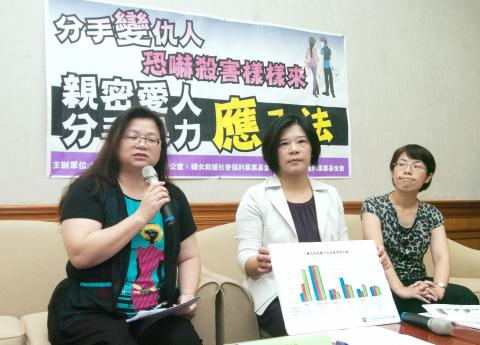An increase in reported cases of domestic violence among non-cohabiting unmarried couples shows how society has changed and why such violence should be treated as a crime, Democratic Progressive Party (DPP) Legislator Wu Yi-chen (吳宜臻) told a news conference yesterday.
“As the natures of people’s relationships and family structures become more diverse within a changing society, so do the types of domestic violence between partners. However, the Domestic Violence Prevention Act (家庭暴力防治法) has not kept up with these changes,” Wu said.
Violence between unmarried partners who do not live together has the dubious distinction of not being covered by the act, and a survey conducted by the Taipei Women’s Rescue Foundation (TWRF) between August and October last year found that 23.8 percent of domestic violence cases fell into that category, with most of the victims being women aged between 18 and 25 years old, she said.

Photo: Wang Min-wei, Taipei Times
“The current legislation prevents these victims from applying for restraining orders. They can only file criminal lawsuits after being physically assaulted or threatened,” Wu added.
The lawmaker said she would propose to amend the act in the next legislative session, and called on the public to support such a move.
The government should provide all victims of domestic abuse with legal protection, said Wang Yueh-hao (王玥好), deputy executive officer of the Garden of Hope Foundation, citing a case in which a victim who was stalked and harassed by a former partner was not able to obtain a restraining order until providing the court with evidence that the two had lived together on weekends before they separated.
TWRF chief executive officer Kang Shu-hua (康淑華) called for Taiwan to follow the examples set by some Western countries which offer protection to victims of violence in cases where the couple are unmarried and do not live together.
“The victims of more than 25 percent of the reported cases of domestic violence in Taiwan do not live with their current or former partners, which means that more than one-quarter of all victims of such abuse are not protected by law,” Kang said.

Alain Robert, known as the "French Spider-Man," praised Alex Honnold as exceptionally well-prepared after the US climber completed a free solo ascent of Taipei 101 yesterday. Robert said Honnold's ascent of the 508m-tall skyscraper in just more than one-and-a-half hours without using safety ropes or equipment was a remarkable achievement. "This is my life," he said in an interview conducted in French, adding that he liked the feeling of being "on the edge of danger." The 63-year-old Frenchman climbed Taipei 101 using ropes in December 2004, taking about four hours to reach the top. On a one-to-10 scale of difficulty, Robert said Taipei 101

A preclearance service to facilitate entry for people traveling to select airports in Japan would be available from Thursday next week to Feb. 25 at Taiwan Taoyuan International Airport, Taoyuan International Airport Corp (TIAC) said on Tuesday. The service was first made available to Taiwanese travelers throughout the winter vacation of 2024 and during the Lunar New Year holiday. In addition to flights to the Japanese cities of Hakodate, Asahikawa, Akita, Sendai, Niigata, Okayama, Takamatsu, Kumamoto and Kagoshima, the service would be available to travelers to Kobe and Oita. The service can be accessed by passengers of 15 flight routes operated by

Taiwanese and US defense groups are collaborating to introduce deployable, semi-autonomous manufacturing systems for drones and components in a boost to the nation’s supply chain resilience. Taiwan’s G-Tech Optroelectronics Corp subsidiary GTOC and the US’ Aerkomm Inc on Friday announced an agreement with fellow US-based Firestorm Lab to adopt the latter’s xCell, a technology featuring 3D printers fitted in 6.1m container units. The systems enable aerial platforms and parts to be produced in high volumes from dispersed nodes capable of rapid redeployment, to minimize the risk of enemy strikes and to meet field requirements, they said. Firestorm chief technology officer Ian Muceus said

MORE FALL: An investigation into one of Xi’s key cronies, part of a broader ‘anti-corruption’ drive, indicates that he might have a deep distrust in the military, an expert said China’s latest military purge underscores systemic risks in its shift from collective leadership to sole rule under Chinese President Xi Jinping (習近平), and could disrupt its chain of command and military capabilities, a national security official said yesterday. If decisionmaking within the Chinese Communist Party has become “irrational” under one-man rule, the Taiwan Strait and the regional situation must be approached with extreme caution, given unforeseen risks, they added. The anonymous official made the remarks as China’s Central Military Commission Vice Chairman Zhang Youxia (張又俠) and Joint Staff Department Chief of Staff Liu Zhenli (劉振立) were reportedly being investigated for suspected “serious